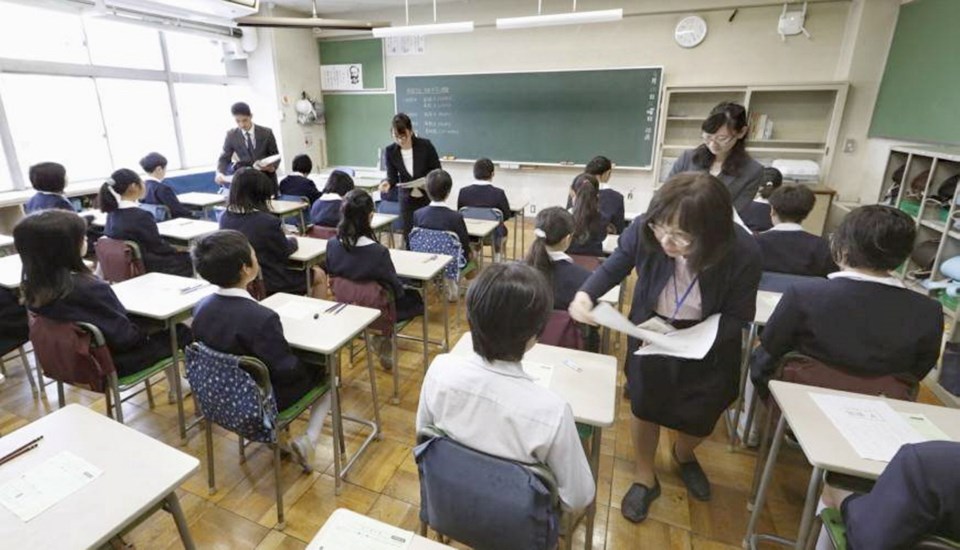Former U.S. president Ronald Reagan once famously said: “The nine most terrifying words in the English language are: I’m from the government and I’m here to help.” Nowhere is that more relevant than in today’s local school.
Once upon a time, government allowed common sense, knowledgeable teachers and school administrators to handle the day-to-day duties of educating our students, and to follow strong, fundamental principles outlined in school curricula. Now we have gurus brought in to teach teachers how to teach, and consultants preaching to ministry officials about how changing the culture in schools is necessary to prepare our kids for jobs that haven’t even been invented yet — a claim that has no element of truth, yet is the foundational aspect for the province to reinvent our educational system.
School is no longer a place for kids to learn times tables, or to be enriched by Shakespeare’s sonnets. The focus is on preparing kids for an unknown future, pushing failed fads such as “personalized learning” and generic skills as more significant for today’s “learner.”
Education has become a complex business. And, as business models go, the usual spin to ensure compliance has begun. The preamble in a recent brief outlines changes to B.C. graduation requirements:
“The B.C. Education Plan is moving toward educational choice and flexibility, with less focus on specific facts and more on concepts and competencies … teaching is no longer about imparting or mediating knowledge, and learning is no longer about absorbing information … teaching will involve empowering and guiding learners, who will engage in discovery, creativity and problem solving.”
Everyone has their marching orders, and the evidence to support an effective education system falls by the wayside. Nothing outlined in the preamble is accurate, and further discussion with some of the committee members tasked with developing these changes indicates how little confidence they have regarding teachers’ ability to remain relevant in the classroom.
The Advisory Group on Provincial Assessment included ministry staff, British Columbia Federation of Teachers, British Columbia Confederation of Parent Councils, British Columbia Superintendents’ Association, British Columbia School Trustees Association, and every other stakeholder group involved in your child’s education system. All of these groups also support the new B.C. Education Plan, which is fashioned on the same progressive, constructivist principles that have already been tried and failed in every single jurisdiction where they have been implemented.
The architects of this new curriculum suggest it’s revolutionary and supported by empirical research … it isn’t. In a December 2017 British Columbia Teacher’s Federation Survey, only 15 per cent of the respondents were fully supportive of the new curriculum.
Education is the second largest expenditure in the province, yet it receives little scrutiny in terms of where and how money is spent. “Trust us, we’re the experts” is the standby phrase now used in schools and professional-day workshops everywhere.
A few years in and parents realize they’ve been duped. They are then forced to bridge the gap of the system’s failures by paying additional tutoring costs or investing in additional hours at home, to ensure their kids don’t fall through the cracks.
Recently, my daughter returned from a semester in Japan. When asked about the differences between what students were learning in math class there, vs. what kids were learning here, she exclaimed there really was only one difference. She said her Japanese classmates were learning the same material that was being taught at her local high school here, with one subtle, yet significant difference: Her Japanese classmates had never used calculators. The internet and computers played no part in learning in the classroom.
Also, Japanese students were arriving at answers at a faster pace than her local schoolmates were finding with calculators here. This subtle yet significant clarification indicates her Japanese counterparts are two to four years ahead of our kids. How are our kids ever going to compete against that in the new global economy?
Despite the millions being spent, experts are still failing our kids. Kids in foster care still haven’t written the Math 12 exam, and now provincial exams are no longer mandatory. Without any provincial standards left in this province, it’s distressing to wonder how far-reaching this disaster will spread.
Is this what we expect from our tax dollars? As back to school approaches, I urge you to think about that.
Tara Houle is a parent advocate who lives in North Saanich and is founder of WISE Math B.C.



